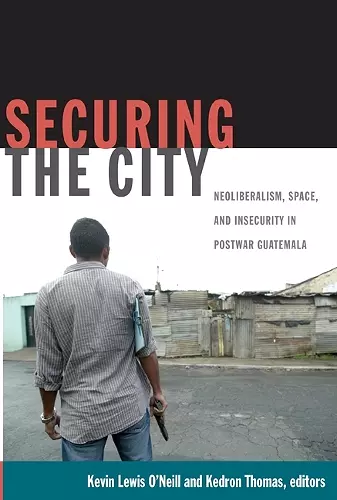Securing the City
Neoliberalism, Space, and Insecurity in Postwar Guatemala
Kevin Lewis O'Neill editor Kedron Thomas editor
Format:Paperback
Publisher:Duke University Press
Published:9th Mar '11
Currently unavailable, and unfortunately no date known when it will be back

Essays on violence in Guatemala City, one of the most dangerous cities in the world
Anthropologists and historians examine how postwar violence in Guatemala City is reconfiguring urban space, transforming the relationship between city and country, and exacerbating structures of inequality and ethnic discrimination.Unprecedented crime rates have made Guatemala City one of the most dangerous cities in the world. Following a peace process that ended Central America’s longest and bloodiest civil war and impelled the transition from a state-centric economy to the global free market, Guatemala’s neoliberal moment is now strikingly evident in the practices and politics of security. Postwar violence has not prompted public debates about the conditions that permit transnational gangs, drug cartels, and organized crime to thrive. Instead, the dominant reaction to crime has been the cultural promulgation of fear and the privatization of what would otherwise be the state’s responsibility to secure the city. This collection of essays, the first comparative study of urban Guatemala, explores these neoliberal efforts at security. Contributing to the anthropology of space and urban studies, this book brings together anthropologists and historians to examine how postwar violence and responses to it are reconfiguring urban space, transforming the relationship between city and country, and exacerbating deeply rooted structures of inequality and ethnic discrimination.
Contributors. Peter Benson, Manuela Camus, Avery Dickins de Girón, Edward F. Fischer, Deborah Levenson, Thomas Offit, Kevin Lewis O’Neill, Kedron Thomas, Rodrigo José Véliz
“This book makes a valuable contribution to the emerging anthropological literature on the social and cultural dimensions of neoliberal restructuring. Its vivid chapters both show us what neoliberalism ‘looks like’ in Guatemala and invite us to think about how we might pursue a broader discussion about topics (violence, crime, security, urban space) that cut across regions and demand a global and relational analysis. An impressive collection.”—James Ferguson, author of Global Shadows: Africa in the Neoliberal World Order
“Together these chapters unsettle easy binaries and simplified notions of victimhood. The city and countryside shape each other far more than is often stated. And vulnerable city residents act on urban space to make it theirs again. The editors’ introduction is a forceful theoretical and empirical reframing of the usual representations of the miseries of the poor in the city. They succeed in making the study of Guatemala City a lens into a broader Latin American history.”—Saskia Sassen, author of Territory, Authority, Rights: From Medieval to Global Assemblages
“The editors of Securing the City are to be applauded for working to shatter common narratives that pin the blame for Guatemala’s urban violence on ‘delinquents,’ urban gangs, rural lynch mobs, or other such bogeymen. The work also dismantles the imagined boundaries between city and country, and for this it merits praise.” -- Kirsten Weld * ReVista *
"[A] unique piece of work that provides an interesting corrective to the majority of literature on Guatemala that focuses on rural, indigenous issues…. These essays are drawn together by, and provide an important contribution to, the ethnographic exploration of space, identity, and the economic opportunity structure (or lack thereof) as shaped by contemporary neoliberal policy, discourse, and practice." -- James H. McDonald * Ethnohistory *
“As a whole and as individual chapters, this book delivers what many others promise but never do; that is, to describe, analyse and explain the grassroots and everyday experiences and practices of neoliberalism, violence and security. In some ways, the Guatemalan context is irrelevant as the wider processes that affect many countries of the world today come to the fore. Yet in other ways, this is one of the most interesting books about Guatemala available today; it challenges many preconceived ideas about the country, about its indigenous population, about the nature and causes of violence and insecurity, and about the formation of porous and contested urban space.” -- Cathy McIlwaine * Journal of Latin American Studies *
“An important contribution to the growing field of urban studies and in/security and would work well on the curriculum of a class on urban studies...it provides a refreshing addition to the literature on the segregation of social lives in so-called postmodern cities.” -- Regnar Kristensen * Ethnos *
“Securing the City addresses both a timely topic (Guatemala's spectacular levels of personal and community insecurity) and a highly under-ethnographed region (in anthropologist-saturated Guatemala!), Guatemala City…. The editors have done us a great service in making more of Spanish anthropologist Manuela Camus's groundbreaking research on urban Maya available in English.” -- Abigail Adam * EIAL *
ISBN: 9780822349587
Dimensions: unknown
Weight: 340g
232 pages